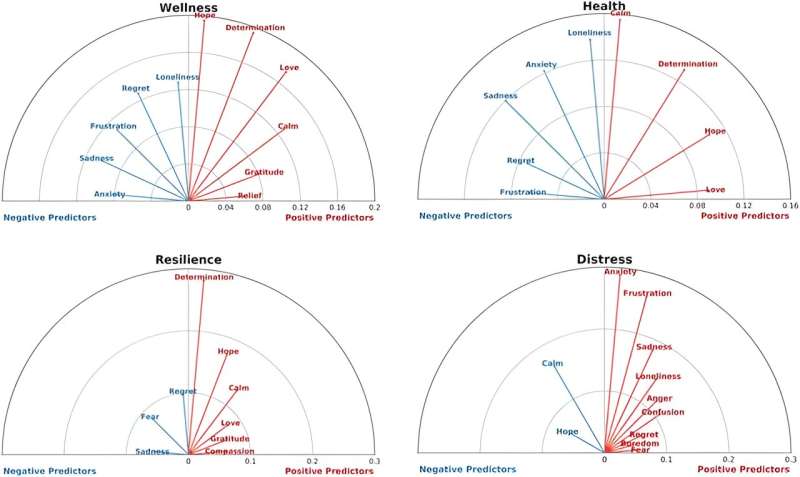This article has been reviewed according to Science X's editorial process and policies. Editors have highlighted the following attributes while ensuring the content's credibility:
fact-checked
peer-reviewed publication
trusted source
proofread
Worldwide study investigates emotional experiences and psychological well-being during the COVID-19 pandemic

Periods of collective stress, such as a pandemic or climate crisis, have a major impact on our psychological well-being. What role do emotions play in helping us cope during tough times? In a worldwide study by sixty-two scientists among more than 24,000 participants in fifty-one countries, a relationship was established for the first time between specific emotions and well-being during a period of collective stress.
Calm and hope appear to be promising routes to psychological well-being. Anxiety, loneliness, and sadness are consistently associated with reduced well-being. This is an important finding for well-being interventions, especially in view of future societal crises.
Psychological well-being is promoted by positive emotions, but how we experience emotions is very specific. For example, we do not just feel good, but relieved or determined or amused. Similarly, we do not just feel bad, but angry, or sad, or lonely.
Emotions with the same charge, positive or negative, can also lead to completely different behaviors. For example, we behave differently when we are proud than when we are grateful. Or when we are angry than when we are bored. Understanding how specific emotions are linked to our behaviors and well-being provides tools to improve our well-being. This has now been tested on a large scale for the first time.
Hope gives resilience
And why are these five emotions particularly important? The researchers point out that calm activates the parasympathetic nervous system which helps with stress recovery. And hope provides resilience because it helps people focus on opportunities in their environment. It therefore acts as a protective mechanism against stress. Prolonged anxiety or sadness, on the other hand, are known to increase the risk of psychological problems. Finally, loneliness is strongly related to the lack of social relationships that are important for our mental health.
Welfare interventions
The findings, the scientists say, provide a key to strengthening individual and societal interventions to improve well-being. "Not only individuals, but also organizations and public institutions can help to create opportunities for experiences of calm and hope, and interventions to tackle anxiety, sadness, and loneliness," says co-researcher Disa Sauter of the University of Amsterdam. "This is especially important given the collective stress that we can expect in the future, for example as a result of climate change."
Global research on emotions and psychological well-being
Sixty-two scientists from all over the world (including researchers from the University of Amsterdam, the University Chicago Booth School of Business, the University of Cambridge, the University of Oxford, and the University of Wisconsin Madison) tested the hypothesis that certain kinds of emotional experiences relate to psychological well-being during a stressful period.
They studied the relationship of twenty different emotions with well-being during the COVID-19 pandemic, a period of great psychological stress for people worldwide. The researchers conducted a survey among 24,221 participants in fifty-one countries during the COVID-19 outbreak, and additionally conducted a replication study in the US and UK and a longitudinal diary study.
Calm, hope, anxiety, loneliness, and sadness
The scientists found that across all countries, five emotions were consistently linked to psychological well-being, namely calm, hope, anxiety, loneliness, and sadness. Experiences of these five emotions predicted later changes in well-being. Calm and hope were linked to better psychological well-being, while anxiety, loneliness, and sadness with lower well-being.
"These results were confirmed in the replication and diary study and were very consistent across countries," says one of the researchers Rui Sun of the University of Amsterdam/ University Chicago Booth School of Business. "This is remarkable since the circumstances between countries differed strongly. For example, countries varied dramatically in governmental pandemic policies and levels of prosperity."
The paper is published in the journal Emotion.
More information: Rui Sun et al, Emotional experiences and psychological well-being in 51 countries during the COVID-19 pandemic., Emotion (2023). DOI: 10.1037/emo0001235





















